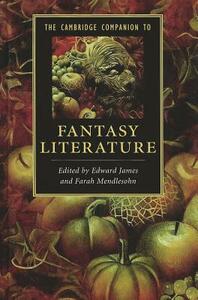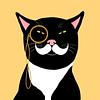Take a photo of a barcode or cover
I worry two stars is overly harsh, but it's how I'm feeling right now. To be fair to the book, I didn't really sit down and consider what I was expecting before I opened this book. Whatever the case may be, and whether or not my subconscious expectations were realistic, this didn't meet them.
What was I expecting? I suppose I hoped to gain some insight about the development and state of the fantasy genre. This is not to say there weren't a few gems tucked in here or there, but overall this book seemed bland and aggressively insightful.
Most of the book follows the pattern of an author saying, "let's talk about X," and then proceeding to list off and summarize a dozen different authors or books that happen to have some relationship to the topic. Yes, yes. You are very well read on the topic and you know some good examples. So what?
We spend most of the book trying to draw arbitrary boxes around what fantasy and it's branches *are*, and I'm not sure a single one of them convinced me that their box matters, that it says anything interesting, or that it's valuable in some way.
Other than a few highlighted quotes I need to revisit, the only thing I'm walking away from this book with is a few new books on my TBR list.
What was I expecting? I suppose I hoped to gain some insight about the development and state of the fantasy genre. This is not to say there weren't a few gems tucked in here or there, but overall this book seemed bland and aggressively insightful.
Most of the book follows the pattern of an author saying, "let's talk about X," and then proceeding to list off and summarize a dozen different authors or books that happen to have some relationship to the topic. Yes, yes. You are very well read on the topic and you know some good examples. So what?
We spend most of the book trying to draw arbitrary boxes around what fantasy and it's branches *are*, and I'm not sure a single one of them convinced me that their box matters, that it says anything interesting, or that it's valuable in some way.
Other than a few highlighted quotes I need to revisit, the only thing I'm walking away from this book with is a few new books on my TBR list.
Quite heavy reading. Extremely informative and well researched as is expected of a Cambridge Companion. However there is some confusion regarding Urban fantasy and paranormal romance.
Vyborna kniha! Nemohly by vsechny akademicke texty byt napsane tak srozumitelne a ctive, Jezisku?
Varovani ministerstva zdravotnictvi: cteni teto knihy zpusobuje znacne nafouknuti to-read listu.
Varovani ministerstva zdravotnictvi: cteni teto knihy zpusobuje znacne nafouknuti to-read listu.
http://nwhyte.livejournal.com/2125825.html[return][return]an excellent set of essays on various aspects of the fantasy literature, with a very strong historical introduction (apart from a bizarre chapter on children's fantasy), a middle section on various literary approaches to the genre, and a concluding section on various subgenres or "clusters", with a much better chapter on children's fantasy. When I read books like this I want i) a better understanding of books I have already read and ii) suggestions of books I might read in the future which may appeal to me, and I was fully satisfied on both points. In particular I note that many chapters referenced Rosemary Jackson's Fantasy: The Literature of Subversion, which I must now look out for. (Other individuals with more than ten references in the index: King Arthur, Jorge Luis Borges, John Clute, Sigmund Freud, Neil Gaiman, Alan Garner, Elizabeth Hand, E.T.A. Hoffmann, Ursula K. Le Guin, C.S. Lewis, H.P. Lovecraft, George MacDonald, Farah Mendlesohn, China Mi�ville, Edgar Allan Poe, Philip Pullman, and way in the lead J.R.R. Tolkien.) Strongly recommended.
These series of essays were quite helpful in thinking and analyzing fantasy literature. I took a lot of notes and feel like I have a clearer understanding of this kind of genre.
Not all essays in this collection were relevant for my thesis, but I skimmed the ones that weren't and I thought the quality of the collection was very good. My favorite ones were:
"The Development of Children's Fantasy" by Maria Nikolajeva
"Writers of Colour" by Nedi Okorafor (a pleasant surprise, because I did not know that she was included in this collection)
"Modern Children's Fantasy" by Catherine Butler
"The Development of Children's Fantasy" by Maria Nikolajeva
"Writers of Colour" by Nedi Okorafor (a pleasant surprise, because I did not know that she was included in this collection)
"Modern Children's Fantasy" by Catherine Butler
informative
Overall I really enjoyed the approach to this collection of essays it definitely introduced to me new ways of thinking about fantasy. There were some essays in the genre category that already feel a bit outdated (the one about dark fantasy in particular) but this book was also great for providing recommendations for both fantasy novels and criticism for fantasy.
A really interesting mix of essays and I appreciated the historical tour at the beginning of this one far more than the one in the CC to SF.
I also loved appreciated the theoretical surveys, although I found the genre ones less...interesting. And, of course, I got some good book recs out of it.
I also loved appreciated the theoretical surveys, although I found the genre ones less...interesting. And, of course, I got some good book recs out of it.
Several essays from The Cambridge Companion to Fantasy Literature was assigned as recommended reading when I took a class on Fantasy and Horror Literature. I enjoyed the assigned essays and finally finished reading all the other essays in the companion.
I enjoyed the structure and variety of this collection. It is divided into three sections: the first regards the history of the genre; the second explores critical and theoretical approaches to the genre; and the third and final considers specific aspects of the genre.
I recommend this collection to anyone interested in understanding the function of the fantasy genre or exploring specific subgenres.
One of the best things about reading these collections is that they often discuss a wide range of literature and provide a variety of viewpoints. As a result, you`re likely to discover many other new texts to read based on the analysis found within the companion.
This serves as a great introduction to a study of fantasy literature in its many guises. The only complaint I have pertains to a few essays: there was at least one that was more artistic than informative/argumentative - it almost read like propaganda; there were a few others that consisted almost entirely of plot summary, which was disappointing, because they could have developed their ideas further.
3.5/5
I enjoyed the structure and variety of this collection. It is divided into three sections: the first regards the history of the genre; the second explores critical and theoretical approaches to the genre; and the third and final considers specific aspects of the genre.
I recommend this collection to anyone interested in understanding the function of the fantasy genre or exploring specific subgenres.
One of the best things about reading these collections is that they often discuss a wide range of literature and provide a variety of viewpoints. As a result, you`re likely to discover many other new texts to read based on the analysis found within the companion.
This serves as a great introduction to a study of fantasy literature in its many guises. The only complaint I have pertains to a few essays: there was at least one that was more artistic than informative/argumentative - it almost read like propaganda; there were a few others that consisted almost entirely of plot summary, which was disappointing, because they could have developed their ideas further.
3.5/5





